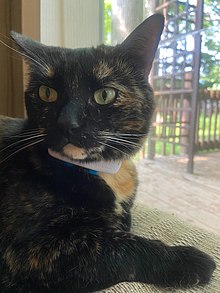Cat collar
A cat collar is a piece of material put around the neck of a cat. Cat collars are put on cats by their owners for identification, fashion, protection (as from fleas), restraint, or to warn off prey, and may be worn by cats that are indoor-only as well as cats with outdoor access.[1]
Collar safety
[edit]As of 2021, there is ongoing debate about whether standard or breakaway collars (collars that unclasp with the application) are safer, or if cat collars are safe at all.[2][3]
A 2010 study reported on in the New York Times showed that simple buckle collars are actually the safest for cats.[4][5][6] Another study from 2013 showed that the dangers to a cat that is lost outside without a collar (or having lost its collar) were substantially greater than the danger of a cat hurting itself on its collar.[7]

However, vets and animal welfare organizations continue to primarily recommend breakaway collars, as they present the least risk of a cat injuring itself on a collar.[8]
Types of collars
[edit]
Typical cat collars may be secured on the neck of the cat via a simple buckle, an elastic strap, or a breakaway buckle.[1] Harnesses may also be used.[citation needed] Elizabeth collars are cones which prevent cats from licking themselves, often used to help cats recover from injury.
Anti-predation collars
[edit]Domesticated cats are among the most significant predators of wild birds—being responsible for over a billion bird deaths every year, as well as the extinction of 22 species of bird as of 2015. Anti-predation collars may be used to reduce bird deaths from domesticated cats.[9] These collars may include conspicuous fabrics, colors, and/or bells. A 2013 study reported on in The Atlantic showed that cats wearing anti-predation collars killed 19 times fewer birds than cats without anti-predation collars.[9]
See also
[edit]References
[edit]- ^ a b Johnson-Bennett, Pam (2011-09-27). Think Like a Cat: How to Raise a Well-Adjusted Cat--Not a Sour Puss. Penguin. ISBN 978-1-101-55267-4.
- ^ Ihli, Noelle (19 June 2020). "The best cat collar". chicagotribune.com. Retrieved 2021-04-01.
- ^ Daugherty, Phyllis M. (23 December 2019). "Lifesaving Gift for Dogs, Cats Keeps Them Safe - Don't Risk a Fatal 'Collar Accident'". CityWatch Los Angeles. Retrieved 2021-04-01.
- ^ Carolina, University of South. "Should Your Cat Be Wearing an Orange Collar?". Treehugger. Retrieved 2021-04-01.
- ^ Bhanoo, Sindya N. (2010-09-13). "Helping Cats to Make Their Way Back Home". The New York Times. ISSN 0362-4331. Retrieved 2021-04-01.
- ^ Wirth, Jenna (2020-12-04). "According to Vets, Your Cat Probably Should Wear a Collar (Even If They Stay Indoors)". POPSUGAR Pets. Retrieved 2021-04-01.
- ^ "Assessing the safety of collars used to attach predation deterrent devices and ID tags to pet cats". ResearchGate. Retrieved 2021-04-01.
- ^ "La Plata Humane Society Offers Advice To Help Pets Live Their Best Life". 8 April 2021. Retrieved 24 May 2021.
- ^ a b Gearin, Conor (2015-12-09). "How to Stop a Bird-Murdering Cat". The Atlantic. Retrieved 2021-04-01.
